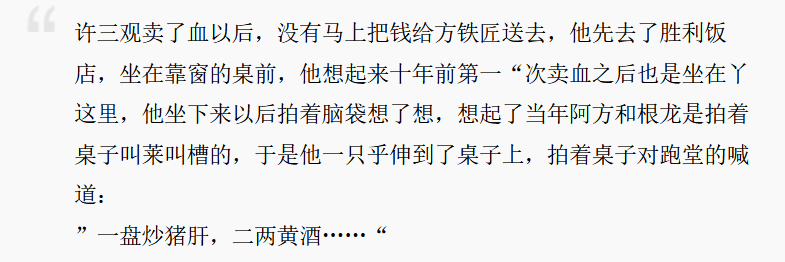Recently I finished the famous Chinese novel “Chronicle of a Blood Merchant” by Yú Huá. This is why I liked the story and greatly recommend it to (upper) intermediate and advanced Chinese learners.
About the book
“Chronicle of a Blood Merchant”《许三观卖血记》was written by 余华 (Yú Huá) and first published in 1995. The Chinese edition counts 264 pages and 29 chapters. This book was a national bestseller and has been translated into Korean, German, Italian and other languages and published abroad.
Story line
The story revolves around the factory worker 许三观 (Xǔ Sānguān) who sells blood at a very young age to earn money. He marries the “fried dough sticks vendor” 许玉兰 (Xǔ yùlán) and has three children with her. However, their first son bears no resemblance to his father, which raises questions. This is however not the only difficult situation he has to overcome.
It is not that Xǔ Sānguān constantly goes to the hospital to sell blood, much more that he only does this in exceptional situations and when the need is great. This act is always accompanied by a number of fixed rituals that Xǔ Sānguān considers necessary for a good outcome. After all, donating blood is not without risks.
Difficulty and short sample
The novel is a surprisingly readable book. Just like in “To Live“, the author deliberately does not use complex literary language, but rather the language used by the characters in the book and which fits well with the raw reality that is described. This makes the book accessible to learners of Chinese. Certainly if you are at a HSK 4 or 5 level and want to read something other than a graded reader.
Once you are well into Chronicle of a Blood Merchant, the story flows effortlessly. The fast-paced narrative, filled with gripping moments, keeps readers engaged. Especially if you have an interest in modern Chinese history, as the novel is set primarily in the Mao-era, capturing the unique struggles, campaigns, and social upheavals of that period.
What I like about the book
“许三观卖血记” is a moving story, told without literary gimmicks – very clearcut and straightforward. There’s a central storyline that unfolds chronologically, so as a reader, you don’t have to jump back and forth too much. The number of characters, and thus the number of complex Chinese names, is also manageable. 余华 (Yú Huá) provides an intimate look at life under Mao, telling about the impact of political movements like the Great Leap Forward and the Cultural Revolution, which shape the characters’ lives in profound and often heartbreaking ways. In short, a very readable and touching story that’s also historically interesting.
About the author
余华 (Yú Huá) is a renowned Chinese author known for his powerful, often darkly humorous novels that explore China’s social and political changes. His most famous works, like the earlier mentioned To Live and Brothers, delve into themes of survival, resilience, and the impact of historical upheaval on ordinary lives. His writing blends realism with sharp irony, making him one of the most influential voices in contemporary Chinese literature. I found this introduction to the life and works of Yú Huá on YouTube.
Reception in Mainland China and internationally
Yú Huá’s novel Chronicle of a Blood Merchant《许三观卖血记》was met with mixed but significant attention both in Mainland China and internationally. In China, it was appreciated for its raw, unfiltered portrayal of a working-class man’s struggles in a rapidly changing society, though some viewed it as controversial due to its bleak themes and criticism of social hardships. Internationally, the novel was widely praised for its dark humor and poignant storytelling, often compared to classic Western literature for its exploration of universal themes like poverty, family loyalty, and resilience. It helped establish Yú Huá as a prominent figure in contemporary Chinese literature, especially in the West where readers admired its honest reflection on the human condition.
Conclusion
“Chronicle of a Blood Merchant”《许三观卖血记》is the first novel that I read completely on the mobile app Readibu. The in-app dictionary ist not perfect, but still is a great help. It also allows you to tweak the font size, character sets, background color and more. You can find the Chinese version of “Chronicle of a Blood Merchant” online or listen to the audio book on YouTube.
Thanks for dropping by on Kaohongshu. If you have any thoughts or comments for me, feel to write them down below.
Disclosure: These are affiliate links. They help me to support this blog, meaning, at no additional cost to you, I will earn a small commission if you click through and make a purchase.

